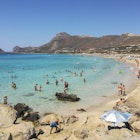
Island-hopping in Greece: everything you need to know
Aug 26, 2021 • 8 min read

Explore the Greek islands by hopping on ferries across the seas © proslgn / Shutterstock
Scattered like pearls across the shimmering Aegean and Ionian seas, the Greek islands have lured in many travelers. From Jason and his adventuring Argonauts to Frankish Crusaders and Mamma Mia film crews, myth and enchantment envelop the islands much like their ribbons of sugar-soft sand.
There’s nothing quite like spotting the shoreline from a sun-drenched ferry deck or sailing into a vibrant port. In Greece, getting there is an essential part of the adventure and, thankfully, island hopping is a breeze.
When is the best time to go to the Greek islands?
While the Greek islands are stunning at any time of year, aim to visit between Orthodox Easter (usually April) and the end of May, or from September to mid-October. During these times, services and amenities are up and running, temperatures are balmy and crowds are thinner. From June until the end of August, you will definitely have warm sea water and hot weather, but you’ll be sharing it with the masses, paying top bill, and the meltemi (dry northerly wind) can play havoc with ferry schedules. In the low winter season, many ferry routes cease to operate, and hotels and restaurants shut up shop.
Depending on which Greek islands you're hoping to visit, it's a good idea to also check the local calendars for panigyria. These Greek summer festivals are unique cultural experiences that can be a lot of fun, but they also might affect ferry schedules, opening hours at attractions, and produce crowds and parades that can otherwise complicate the logistics of getting around. Panigyria on Ikaria, for example, occur all summer long on various saints' days, and some of the festivities run from dusk until dawn.

Should you plan your Greek island-hopping trip in advance?
In reality, it’s best to plan a little and leave a little to chance. A bit of planning can definitely take you a long way. Deciding where you want to go and understanding the ferry schedules before you go will take the work out of your vacation. Having said that, Greece is known for its laid-back attitude, and it’s worth emulating this while island-hopping. Ferry schedules are always subject to change, even pre-booked and pre-paid journeys. Anything from windy weather to worker strikes can mean delay or cancellation at short notice. Building a little flexibility into your schedule is wise.

What are the best Greek island-hopping routes?
You can definitely pick a few options from various groups of Greek islands and create your own route; however, many ferry lines service specific island groups, so planning can be easier if you stick to a single area. All flights lead to Athens – or so it seems – and arriving in the capital not only gives you the opportunity to take in its jaw-dropping sights, but it also brings you close to the port of Piraeus for boats to the Cyclades, Saronic Gulf islands and even more remote island groups like the Dodecanese. Athens also neighbors the port of Rafina for routes to the eastern Cyclades and further afield. To visit the Northeastern Aegean islands, land in Thessaloniki, Greece’s second city.
If you’re planning to spend most of your time in a specific island group, it’s worth catching a domestic flight from Athens to get you started – it will save you both time and money. Practicality aside, there’s nothing quite like descending in a twin engine onto a tiny airstrip in the middle of the bright blue sea. Some island destinations are also served by international flights in high season.
Finding the right Greek island

Which Greek islands are best to visit?
Cyclades
The appeal of the Cyclades is undeniable, and it’s here that you’ll find some of the most popular islands. Be prepared to share, especially in high season. From Piraeus, hop a ferry to Mykonos, the most glamorous of the Greek islands. Overlooked by its iconic windmills, you’ll rub shoulders with the famous as you explore the flower-filled lanes and boutique shops and cafes.
From here, day-trip to the tiny island of Delos with its ancient sun-bleached ruins. Carry on to Naxos, the largest of the Cyclades, with a walled seaside capital surrounding a hilltop castle. Even further south, you’ll reach Santorini with its iconic sunsets, black-sand beaches, vineyards and incredible Minoan site. Complete the loop with a stop in laid-back Milos, with dozens of beaches and charming villages to explore. At the end of the day, hop a ferry back to Piraeus.
12 essential places to visit in Greece

Dodecanese
In the Dodecanese, you’ll see and taste the historical influences of the parade of cultures that have passed through, from Romans and crusading medieval knights to Byzantine and Ottoman rulers. Think plenty of pasta, sugary baklava, stunning minarets, walled cities and crumbling mountaintop castles. The catamaran service that regularly connects the islands makes island-hopping simple. Begin by catching a flight to Rhodes, which abounds in sandy beaches, ancient history and a buzzing city life.
Visit volcanic Nisyros to hike through its verdant forests and into its steaming caldera, and Karpathos for its timeless hilltop village of Olymbos. Kalymnos will call climbers and divers with its undersea wrecks and limestone cliffs, while Patmos has an ethereal quality, where life is in tune with the monastery bells and where St. John experienced his revelations. If you’re visiting around Orthodox Easter, Patmos is the place to be. Loop back to popular Kos for an endless strip of brown-sugar sand, nightlife, easily cyclable roads and an airport with regular flights to Athens.

Ionian Islands
Nestled along the coast of the Peloponnese in the Ionian Sea, the Ionian Islands have a slightly cooler climate, abundantly forested mountains and countless stands of olive and cypress trees. From Athens, you can fly to Corfu where you’ll be wooed by Parisian-style arcades, Venetian alleyways and Italian-inspired delicacies. Corfu is large enough to escape the crowds to cypress-studded hills, lofty villages and sandy coves.
The next island is tiny Paxi, with beautiful harbor villages, rolling hills and ancient olive groves. Visit Lefkada for its sandy beaches and Kefallonia to kayak along the magnificent cobalt-blue bays. Take in time-forgotten Kythira for sugar-cube architecture and unspoiled wilderness. Far flung to the south, you can ferry back to Piraeus from here.

How to book ferry tickets
With a network covering every inhabited island, the Greek ferry system is vast and varied. The slow rust buckets that once plied the seas are nearly a thing of the past. High-speed ferries are increasingly common and cover most popular routes. Local ferries, excursion boats and tiny private fishing boats (called caiques) often connect neighboring islands and islets. Meanwhile, plush catamarans can drastically reduce travel time and cope better with poor weather. For long-haul ferry travel, you can travel in serious comfort.
Many ferry companies have online booking services. Not surprisingly, high-speed boats sell out faster than slow chuggers. For overnight ferries, it’s always best to book ahead. These resources are useful for planning and booking:
A good site for booking boat tickets.
Useful search option and links for ferries.
Search ferry schedules, including accommodation options and multi-leg journeys.
Reliable search engine for ferry routes and schedules.

Tips for traveling the Greek islands
When you book a ticket, you'll find that deck-class is just that: access to the deck and interior but no bunks, berths or cabins. Keep in mind that unless you state otherwise, you will automatically be given deck class when purchasing a ticket. For more luxurious or overnight accommodations, prices climb with airplane-style recliner seats right up to private cabins with bathrooms.
If you are considering taking a ferry overnight, it's worth remembering that a bed for the night in a cabin from Piraeus to Rhodes can be more expensive than a discounted airline ticket. It’s worth shopping around, depending on where you land in the Venn diagram of considerations like cost, travel time, comfort and a desire to experience of sailing the high seas.
If you're traveling around Greece with kids, children under five years of age travel for free on many ferry services, and tickets for those aged between five and 10 are usually half price.
Food on ferries can be overpriced and underwhelming. Bring your own snacks and water, or save your appetite for the famously robust food scenes in destinations like Rhodes and Symi.
You might not have much appetite if you veer towards seasickness. The water can be rough, so stare at the horizon, not the sea. Stay on deck for fresh air and don’t be tempted to read or use binoculars.
If you're hoping to explore the Greek islands by car, note that bringing a car on the ferries is expensive and generally requires advance booking. Car rental on the islands is relatively cheap and possible on almost every island.
If you've got some energy left, or extra room in your itinerary after returning to the mainland, remember that Piraeus is more than just the gateway to the Greek islands. You can easily spend a whole day in Piraeus itself, or at the very least check out the city's vibrant nightlife at popular clubs like and after you disembark the ferry.
This article was originally published in September 2019.
You might also like:
What you need to know about traveling to Greece right now
Unique flavors to savor when in Greece
Dreaming of owning a home in the Mediterranean? Here's all you need to know
Explore related stories









